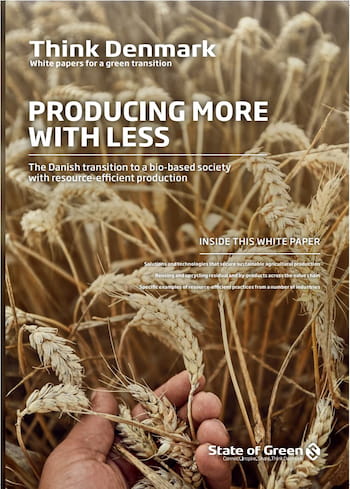Download our publication from producing more with less
This article is part of our publication ‘Producing More with Less’
Download nowPerspective
Biomass


Haldor Topsoe’s MOSAIK™ technology produces chemicals from biomass at a cost that competes with that of traditional oil-based chemicals. As demand for sustainable plastics and materials increase, this can be a turning point for bio-based chemicals.
Cost often puts an end to the desire of lawmakers, industry, and consumers to replace oil with sustainable raw materials, such as biomass. Market mechanisms make it hard or even impossible to replace low-cost commodity chemicals made from oil with a more sustainable alternative. Today’s technologies for producing chemicals and polymers from biomass are simply too expensive. However, new technology can change that. Haldor Topsoe researchers have devised a novel process that produces several chemicals from biomass – at an attractive cost that can compete directly with similar oil-based chemicals.

This article is part of our publication ‘Producing More with Less’
Download nowTopsoe’s MOSAIK™ technology converts concentrated sugars into an oxygen-rich intermediary product that is further processed to a number of chemicals with a wide range of applications. Sugars constitute 75 per cent of all biomass and can be obtained from many different sources such as cane,
beet, corn and even wood and straw. In fact, there is an abundance of sugars in the world. One of the chemicals that MOSAIK™ can produce from sugars at a low cost is monoethylene glycol or MEG.
It is a very common chemical that is used for PET plastic bottles, food wrapping, polyester fabrics, and many more products. Topsoe and Braskem, a leading producer of thermoplastic resins in the Americas, are currently working on a demonstration plant to further develop, test, and validate the process. The overall goal of the partnership is the startup of a commercial plant in 2023. But MOSAIK™ also has the potential to deliver completely new bio-based “building blocks” that can revolutionise industrial processes, lead to new products or improve existing products. Methyl vinyl glycolate (MVG) is an example of a new and highly versatile molecule for use within plastics. It can replace existing materials and also allow for new formulations. All at a price that makes it a commercially interesting option.
Not all chemicals can be made efficiently from biomass. In other cases, biomass can not only replace oil – it can be a better option. Biomass offers a lot of “chemical functions” that can be reused or slightly altered. This can reduce the number of steps in the production, which leads to a more effective process and lower cost compared to oil-based production. MOSAIK™ now shows how to produce a number of bio-based chemicals ranging from well-known commodities to new specialty chemicals in a commercially attractive way.